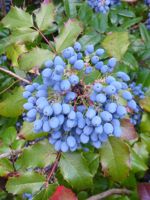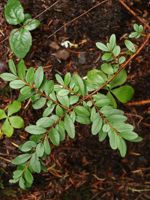Mon-Fri 9am - 5pm Mountain time
Oregon Grape vs Falsebox
Mahonia aquifolium (Berberis aquifolium)
Paxistima myrsinites
NOT AVAILABLE THIS SEASON - MIGHT RETURN
CUSTOM GROW
Oregon Grape is an evergreen shrub native to North America, found along the Pacific coast. In spring, the bright golden-yellow flowers appear in clusters above the leaves. These flowers eventually give way to edible blue berries in late summer. While not a true grape, the berries appear grape-like due to their colouring and clustered growth. They can be eaten fresh, but the sour taste and high amounts of natural pectin make them well suited for preserves.
The Oregon Grape has leaves that are glossy, leathery, and spiny-edged. This feature gives it its alternate name of Holly-leaved Barberry. When the leaves emerge in the spring they are a bronze-red colour. In the summer they transition to green, followed by bright red to deep burgundy in the fall. Leaves are retained throughout the winter and colder temperatures cause the leaves to turn purplish bronze, providing year round interest to the landscape.
Falsebox is a hardy, native evergreen shrub found in forests, rocky slopes, and open woodland sites. Though small and easily overlooked among the leaves, the maroon flowers still supply nectar and pollen for pollinators such as native bees and flies. Blooming in spring, they provide an important early-season food source. Its year-round greenery adds visual interest through the winter.
Falsebox is a low-growing shrub that tolerates a wide range of conditions, including drought once established. It thrives particularly well beneath the shade of mature trees, where few other plants succeed. With its resilience and ecological value, Falsebox is well-suited for naturalization, restoration projects, and diverse landscape plantings.

